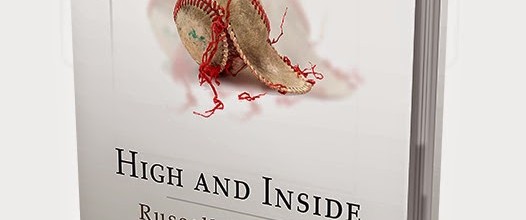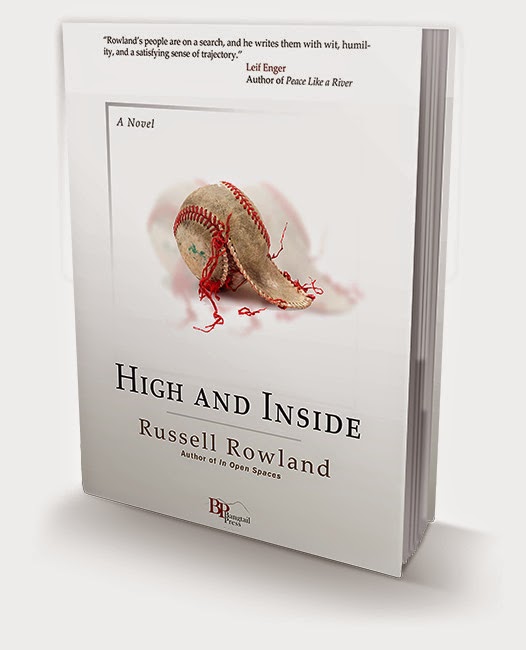Book Review #3: High and Inside by Russell Rowland published by Bangtail Press

This is an interesting week to be reviewing a book about alcoholism. The death of Robin Williams is in the news, but even more, in the world I move in, the idea that this happens to people is a present, maybe even an omnipresent, obsession. Creative people know that they have chosen a community on the edge, and that they may never know how close they’ve got to the edge until they fall off it, or find themselves clinging by their fingertips to whatever they’ve got left of their sanity – or their reason to live.
Robin Williams lost something: his reason, his need, his ability to fill the void for which there is never enough of anything – never enough fame, money, sex, love, drugs, booze, acclaim, awards, work, challenges …. never enough for the moment you find yourself standing, looking in the mirror, and wondering, is this all there is?
So, re-reading Russell Rowland’s High and Inside has been a timely examination of what it takes to answer that question. While his protagonist, Pete Hurley, is not a creative but an athlete, he is gifted, and his gift brings him fame, success (winning the World Series) and adulation – and one extraordinary pitch that ends his career. His name, rather than being associated with the success of the Red Sox, becomes synonymous with a punitive ruling leading to game bans for foul pitches that injure batters. Also interesting, because at least here in the UK, a Suarez is now any kind of a bite … perhaps not the fame that Luis Suarez was seeking!
This real life parallel is not the only glimpse that Rowland offers us of the way that individuals become consumed by their need to win. As Hurley spirals down into an ever smaller life, in which he injures everybody and everything around him, both deliberately and inadvertently, he has an ever greater need to deny that the problem is his. Finally, unwilling to face his own behaviour and unable to avoid the evidence of his appalling actions, he heads for Montana where his sister and her family live, his three-legged dog (her disfigurement is just one consequence of his drinking) in tow and his life in fragments.
What follows, without including spoilers, is less a story of redemption than it is a perspective of what it takes for an alcoholic to find a rock bottom that can lead to recovery. It’s an account of the intensity with which alcohol can distort reality and the ways in which an alcoholic can invest in their drinking, regardless of the effect on those around them and eventually, on their ability to retain any control of their lives.
Hurley, believing he’s starting a new life, finds his old one waiting for him in the prejudices he experiences, the uses he makes of people and the disdain with which treats anybody who tries to show him the mistakes he is repeatedly making. He plans to build a house, although he has no training, no skills and – it turns out – an ability to infuriate and alienate the very people he needs to help him.
By the end of the book Hurley has accepted sobriety and discovered that most of what he’s believed about life is questionable. It seems he may not have had the childhood he remembers, nor ever understood the motivations of those around him. His use of alcohol has blinded him, not just to his own faults, but to the actions and reactions of everybody he’s been close to. He’s been obtuse, arrogant and self-involved as well as talented and driven. It’s only a beginning, like the foundations of his house, but his potential, once based on a natural talent, is now grounded in commitment to self-understanding and the acceptance that he will never be able to drink again.
For those contemplating what could cause a man like Robin Williams to take his life, Rowland’s novel is a valuable exploration of the role of sobriety – not a goal to be achieved but a skill that must be maintained daily, even on days when maintenance doesn’t seem necessary or even desirable – it’s a relentless exercise that is most required when the individual feels least like undertaking it and it’s exhausting even to the strong-willed and well-placed. For those who strive to understand alcoholism in someone they know, this novel offers something else, a clue as to why talent, looks, success, love … are not enough for the alcoholic. It brings some insight into why these attributes can actually fuel, rather than dampen, the desire to drink and it explains why a crisis is usually necessary for an alcoholic to get sober. Finally, it highlights the sombre truth that those who get sober don’t always stay there, and while it ends with Pete Hurly launched into sobriety with high hopes of his future, it counterpoints that ending with a reminder that most of the work is still ahead of him, and that work is arduous and never-ending.
Montana is almost as much a character in this novel as Hurley – and like the journey he makes, it’s a hard but worthwhile territory to explore. In both its scenery and its people it has by turns a bruising and healing effect on Hurley, leaving him alternately battered and elated by his experiences of land and locals.
I know nothing about baseball, and whatever knowledge I have of alcoholics is second hand. Talent I do know about, and the use and misuse of talent is something no creative person can fail to understand, both as part of themselves and as a component of their chose vocation. This novel is about what happens when talent is not enough, and in this case, talent is allied to alcoholism, as is so often the case.
It’s a finely written testament to the nature of recovery and what precedes it, and its characters: Dave the dog, Hurley himself, his conflicted sister and the woman with whom he develops a relationship are real, rounded and worthy of compassion and understanding.



2 Comments
Jim Murdoch
17th August 2014Had you asked me I wouldn’t’ve said that I avoided books that put characters with addictive personalities under the microscope but sitting back for a moment to think I can’t think of any; films, yes, and television programmes but not books. My father and both of my siblings had problems with drink. None were alcoholics but for a good time they developed dependencies. And it wasn’t pretty to watch. So when I see characters on TV chucking back drink after drink as if it was cold tea—which it probably is—I have to remind myself that this is fiction; it’s no different that the hero falling out of a second or third story window and getting off with a few bruises that fade within half an hour.
Williams’s death has prompted a lot of people to have their say. Some have played safe and stuck with their fond memories but others—unwisely, in my opinion—have felt they have the right to judge him and that’s led to some unpleasant exchanges. Everyone appreciates he was unique and so the only way one can judge him is by accepting his uniqueness and if this was what he felt was the answer to his life’s problems who’re we to say he was wrong? We all wish he’d found another solution but he didn’t. I’ve suffered from Depression since I was a teenager but I’ve never felt suicidal. Maybe I’m simply not the suicidal type. It hasn’t provided me with any insight: I don’t get why he chose to end his life.
Your review makes this book sound interesting but I’m not sure I’ll be rushing to read it. I don’t like being in the company of drunks. Their unpredictability actually frightens me. Drink is very much a part of the Scottish culture. As Fish sang (well talked) in ‘Torch Song’ (first the doctor, then the patient’s reply): “My advice is if you maintain this lifestyle you won’t reach thirty / Christ, and it’s a romantic way to go really, it’s part of the heritage.” No one in Glasgow bats an eye if they see a drunk in the street no matter what time of the day it is. I never touch the stuff. I don’t much like it but I also see within myself a weakness that needs no pressure put on it. If I’m going to overindulge let it be in cookies and chocolate.
Kay Sexton
22nd August 2014Jim, I appreciate your comments. I think Robin Williams’ death has shocked many people and that can lead to knee-jerk responses. Fiction and drinking for sure – I’m not terribly keen on the romanticisation of alcohol or drugs in literature or film – but I consider that my response should be to create portrayals that ring true to me. And to promote books that have reasoned and balanced accounts of the way that alcohol dependency affects lives.